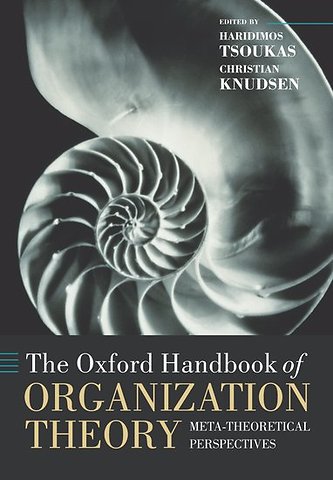

Haridimos Tsoukas holds the Columbia Ship Management Chair in Strategic Management at the University of Cyprus, Cyprus and is a Professor of Organization Studies at Warwick Business School, University of Warwick, UK.
Meer over de auteursThe Oxford Handbook of Organization Theory
Paperback Engels 2005 1e druk 9780199275250Samenvatting
This book provides a forum for leading scholars in organization theory to engage in meta-theoretical reflection on the historical development, present state, and future prospects of organization theory as a scientific discipline. The central question explored is the epistemological status of organization theory as a policy science. This is a meta-theoretical question; the object of analysis and debate in this volume is not a set of organizational phenomena, but organization theory itself.
By drawing attention to organization theory as a practical social activity, this handbook reviews and evaluates important epistemological developments in the discipline. More specifically, the focus is on issues related to the nature of knowledge claims put forward in organization theory and the controversies surrounding the generation, validation, and utilization of such knowledge.
Five sets of questions are raised in the handbook, each one of which is dealt with in a separate section:
1) What does a science of organizations consist of? What counts as valid knowledge in organization theory and why? How do different paradigms view organization theory as a science?
2) How has organization theory developed over time, and what structure has the field taken? What assumptions does knowledge produced in organization theory incorporate, and what forms do its knowledge claims take as they are put forward for public adoption?
3) How have certain well-known controversies in organization theory, such as for example, the structure/agency dilemma, the study of organizational culture, the different modes of explanation, the micro/macro controversy, and the differnet explanations produced by organizational economists and sociologists, been dealt with?
4) How, and in what ways, is knowledge generated in organization theory related to action? What features must organization theory knowledge have in order to be actionable, and of relevance to the world 'out there'? How have ethical concerns been taken into account in organization theory?
5) What is the future of organization theory? What direction should the field take? What must change in the way research is conducted and key theoretical terms are conceptualized so that organization theory enhances its capacity to generate valid and relevant knowledge?
Specificaties
Lezersrecensies
Over Christian Knudsen
Inhoudsopgave
Part I: Organization Theory as Science
1:Organizational Theory as a Positive Science, Lex Donaldson
2:Organization Theory as an Interpretive Science, Mary Jo Hatch and Dvora Yanow
3:Organization Theory as a Critical Science: Forms of analysis and 'new organizational' forms, Hugh Willmott
4:Organization Theory as a Postmodern Science, Robert Chia
Part II: The Construction of Organization Theory
5:The Origins of Organization Theory, William H. Starbuck
6:The Historical and Epistemological Foundations of Organization Theory: Fusing sociological theory with engineering discourse, Yehouda Shenhav
7:Feminist Theory and Organization Theory: A dialogue on new bases, Silvia Gherardi
8:The Styles and the Stylists of Organization Theory, Barbara Czarniawska
9:Pluralism, Scientific Progress, and the Structure of Organization Theory, Christian Knudsen
Part III: Meta-theoretical Controversies in Organization Theory
10:The Agency/Structure Dilemma in Organization Theory: Open doors and brick walls, Michael Reed
11:Modes of Explanation in Organization Theory, Andreas Georg Scherer
12:Micro and Macro Perspectives in Organization Theory: A tale of incommensurability, William McKinley and Mark A. Mone
13:Economic Versus Sociological Approaches to Organization Theory, Richard Swedberg
14:Meta-theoretical Controversies in Studying Organizational Culture, Joanne Martin
Part IV: Organization Theory as a Policy Science
15:Actionable Knowledge, Chris Argyris
16:Theory and Practice in the Real World, Karl E. Weick
17:Organization Theory and Ethics: Varieties and dynamics of constrained optimization, Richard P. Nielsen
18:Character and Virtue in an Era of Turbulent Capitalism, Iain Mangham
Part V: The Future of Organization Theory
19:The Future of Organization Theory: Prospects and limitations, Gibson Burrell
20:Managing Organization Futures in a Changing World of Power/Knowledge, Stewart Clegg
21:The Future of Organization Theory: Beyond the selection-adaptation debate, Arie Y. Lewin
22:At Home from Mars to Somalia: Recounting organization theory, Marta B. Calas
23:New Times, Fresh Challenges: Reflections on the past and the future of organization theory, Haridimos Tsoukas
Anderen die dit boek kochten, kochten ook
Rubrieken
- advisering
- algemeen management
- coaching en trainen
- communicatie en media
- economie
- financieel management
- inkoop en logistiek
- internet en social media
- it-management / ict
- juridisch
- leiderschap
- marketing
- mens en maatschappij
- non-profit
- ondernemen
- organisatiekunde
- personal finance
- personeelsmanagement
- persoonlijke effectiviteit
- projectmanagement
- psychologie
- reclame en verkoop
- strategisch management
- verandermanagement
- werk en loopbaan





